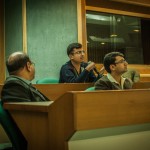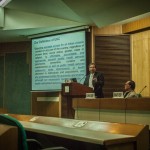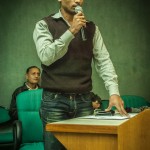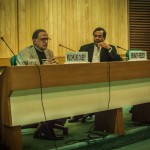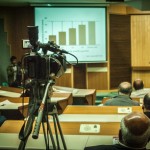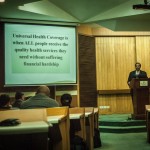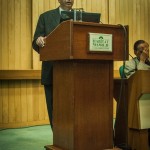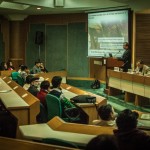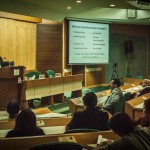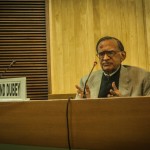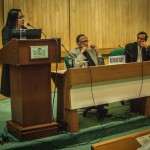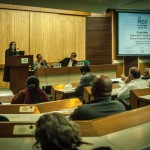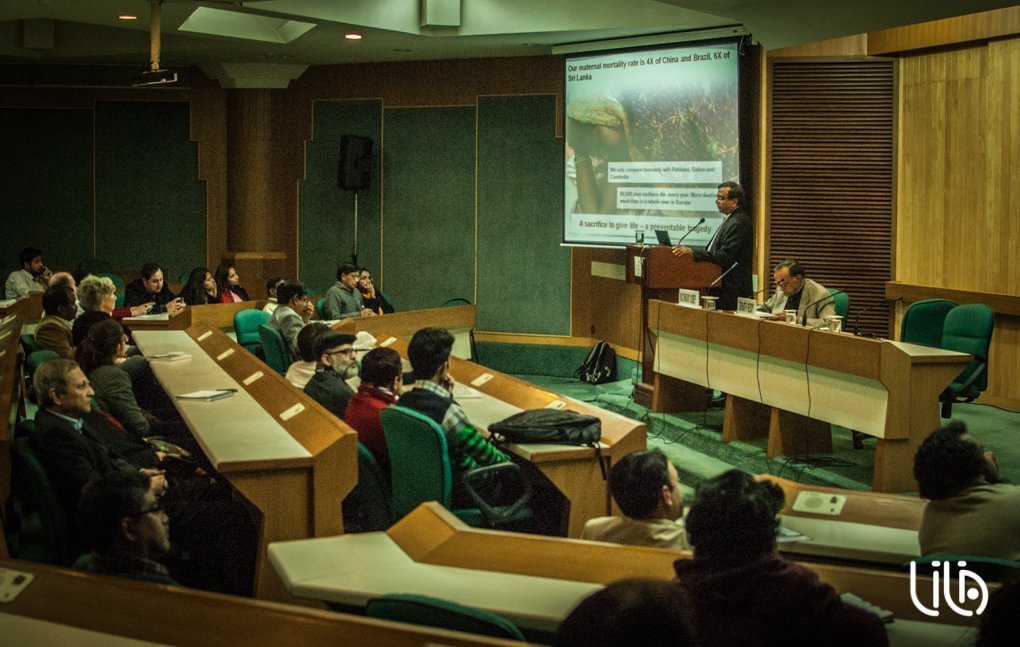
© Samuel Buchoul for LILA Foundation
Monday 23rd, December 2013 – India Habitat Centre
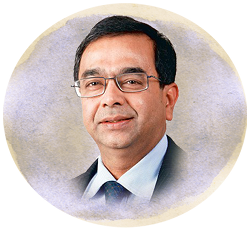 Prof. K. Srinath Reddy is presently President, Public Health Foundation of India (PHFI) and he formerly headed the Department of Cardiology at All India Institute of Medical Sciences (AIIMS). He was appointed as the first Bernard Lown Visiting Professor of Cardiovascular Health at the Harvard School of Public Health in 2009. He is also an Adjunct Professor of the Rollins School of Public Health, Emory University and Honorary Professor of Medicine at the University of Sydney. PHFI is engaged in capacity building in Public Health in India through education, training, research, policy development, health communication and advocacy. He has served on many WHO expert panels and is presently the President of the World Heart Federation (2013-14). He also chairs the Core Advisory Group on Health and Human Rights for the National Human Rights Commission of India and is a member of the National Science and Engineering Research Board of Government of India. He recently chaired the High Level Expert Group on Universal Health Coverage, set up by the Planning Commission of India. He also serves as the President, of the National Board of Examinations which deals with post-graduate medical education in India. Prof. Reddy is a member of the Leadership Council of the Sustainable Development Solutions Network, established to assist the United Nations in developing the post-2015 goals for sustainable development. He chairs the Thematic Group on Health in the SDSN.
Prof. K. Srinath Reddy is presently President, Public Health Foundation of India (PHFI) and he formerly headed the Department of Cardiology at All India Institute of Medical Sciences (AIIMS). He was appointed as the first Bernard Lown Visiting Professor of Cardiovascular Health at the Harvard School of Public Health in 2009. He is also an Adjunct Professor of the Rollins School of Public Health, Emory University and Honorary Professor of Medicine at the University of Sydney. PHFI is engaged in capacity building in Public Health in India through education, training, research, policy development, health communication and advocacy. He has served on many WHO expert panels and is presently the President of the World Heart Federation (2013-14). He also chairs the Core Advisory Group on Health and Human Rights for the National Human Rights Commission of India and is a member of the National Science and Engineering Research Board of Government of India. He recently chaired the High Level Expert Group on Universal Health Coverage, set up by the Planning Commission of India. He also serves as the President, of the National Board of Examinations which deals with post-graduate medical education in India. Prof. Reddy is a member of the Leadership Council of the Sustainable Development Solutions Network, established to assist the United Nations in developing the post-2015 goals for sustainable development. He chairs the Thematic Group on Health in the SDSN.
Prof. Muchkund Dubey, Former Foreign Secretary, Govt of India, served as Chair during the lecture and moderated the discussion. He is the President of the Council for Social Development (CSI) and Chairman of the Asian Development Research Institute, Patna. A former Ambassador, Professor Dubey teaches International Relations at the Jawaharlal Nehru University, Delhi and is Professor Emeritus at the Foreign Service Institute. He is currently researching a wide array of issues related to world economy, international monetary and trading systems, security and disarmament, South Asian cooperation and international relations.
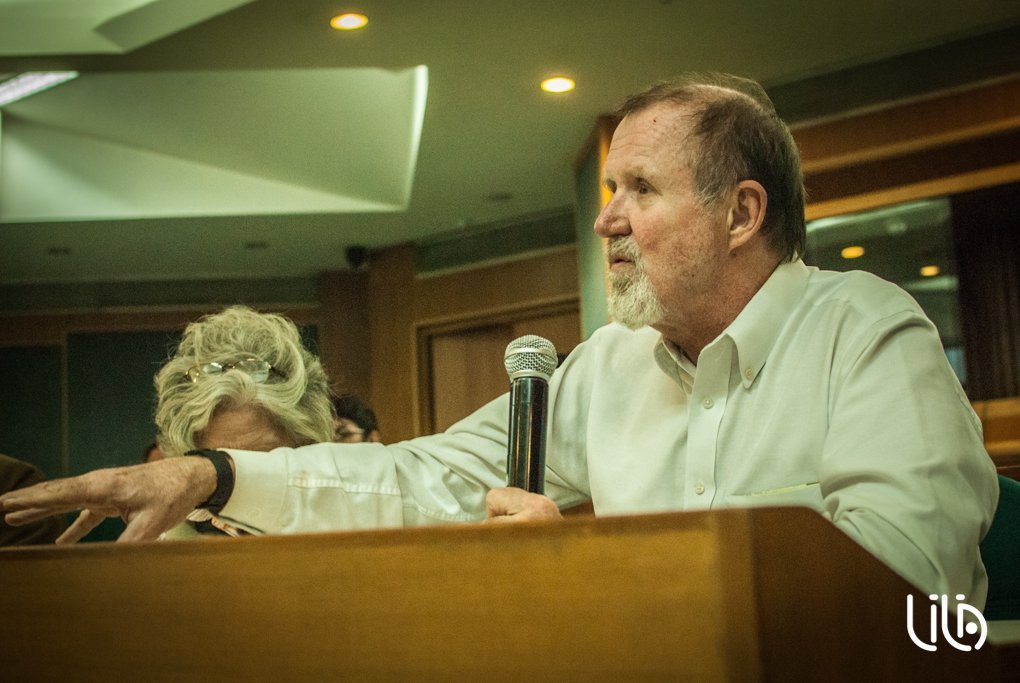
© Samuel Buchoul for LILA Foundation
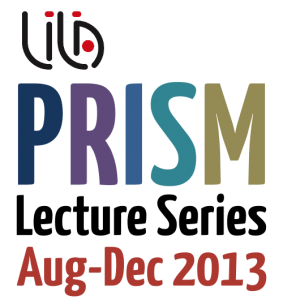 The Lecture: India’s economic growth in the last two decades has not been matched by its health indicators; they do not compare favorably with its peers among low and middle income countries. An under resourced health system is challenged by multiple disease burdens and a high level of health care, by related impoverishment. In the past two years there has been a wide ranging debate on universal health coverage (UHC) to provide greater efficiency and equity in the delivery of health services. The Indian Government has announced its commitment to advance UHC through the 12th Five Year Plan. The pathways for achieving that objective have not been clearly identified and debates continue on the role of the private sector and insurance. The State Governments have a key role to play in the design and delivery of UHC. Their response has been highly variable so far. This lecture will review the state of India’s health and discuss the challenges and opportunities that lie on the road to UHC.
The Lecture: India’s economic growth in the last two decades has not been matched by its health indicators; they do not compare favorably with its peers among low and middle income countries. An under resourced health system is challenged by multiple disease burdens and a high level of health care, by related impoverishment. In the past two years there has been a wide ranging debate on universal health coverage (UHC) to provide greater efficiency and equity in the delivery of health services. The Indian Government has announced its commitment to advance UHC through the 12th Five Year Plan. The pathways for achieving that objective have not been clearly identified and debates continue on the role of the private sector and insurance. The State Governments have a key role to play in the design and delivery of UHC. Their response has been highly variable so far. This lecture will review the state of India’s health and discuss the challenges and opportunities that lie on the road to UHC.
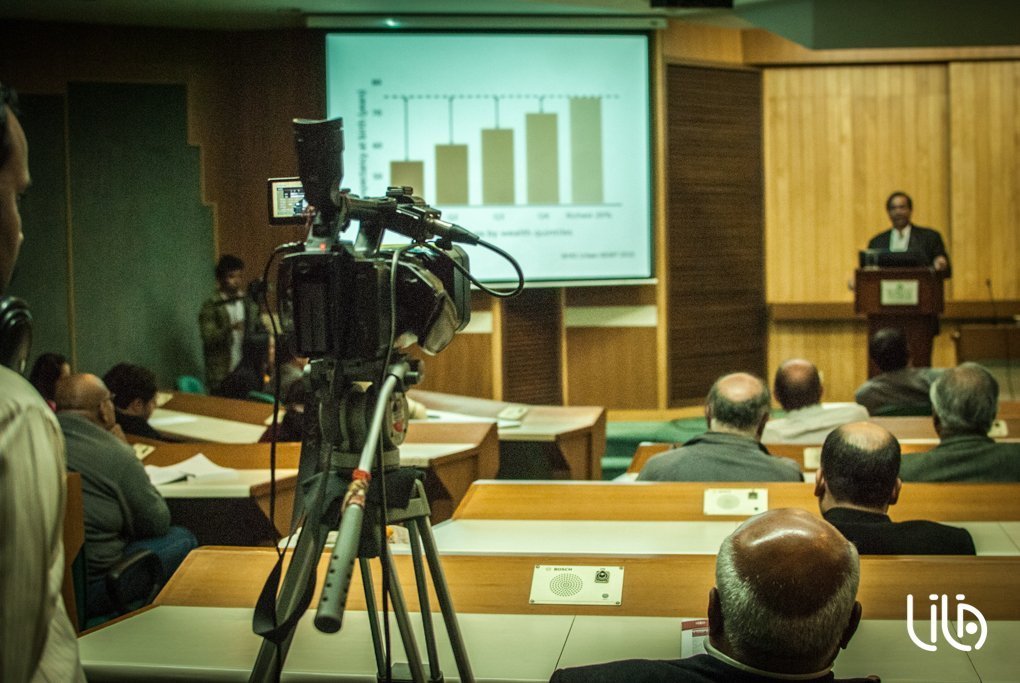
© Samuel Buchoul for LILA Foundation
Srinath Reddy began his lecture by stating that it is important for societies to invest in health, because it has both instrumental and intrinsic values. From a utilitarian point of view, improved health increases productivity, while it offers a sense of well-being to an individual. Health indicators of a society also indicate the amount of vulnerability and values that are shared within that society. In Sridhar Venkatapuram’s words, “a well-ordered society would ensure that all individuals have the capability to be healthy, and at a level that is commensurate with human dignity in the modern world, which is their right.”
Having thus established equity in health as a fundamental criterion for a society to be called modern, Srinath tried to understand what makes such equity possible. He brought up three issues in this context:
- Universal Health Coverage
- Multi-sectoral social action
- Rights-based approach to health.
The most important aspect of the capability to be healthy is its ‘cluster’ implications—attainment of this capability is possible only if we can ensure a cluster of other capabilities and rights within the political and economic systems.
There is no point in creating a framework for equality of opportunity if the circumstances would prevent people from accessing it. The discussion now should revolve around how we may facilitate a social condition that would enable individuals to get an equal start. Ironically, the heath status in India does not match with the economic growth, and this will soon slow down development, and in turn affect economic growth, too.
Even as we claim that life expectancy in India has increased since independence, there are vast differences in the figures from various states. Infant mortality rate is quite high, and we lose 4000 children every day, which is much higher than in Bangladesh, Sri Lanka, Botswana and many other developing countries. This is also related to the fact that we lag behind these countries in basic immunisation to our children, and that 40% of our children are under-nourished. Our maternal mortality rate, too, is very high. We lose more mothers in a week than what the whole of Europe loses in an entire year.
The incidence and prevalence of infectious diseases is another area of concern in our health sector. We are also facing epidemic conditions in the case of chronic diseases, like diabetics and cardiovascular disorders.
After revealing all these figures, Srinath went on to emphasise the importance of primary healthcare in the country, and the present neglect of this sector. We have to ensure day and night service, quality of training and equipment, staff, infrastructure and essential drugs. And the primary health sector will not function properly even if the centres themselves are thus equipped, unless health is aligned with other development segments dealing with water, roads, telecommunication, electricity etc.It is a pity that India’s public expenditure on health is among the lowest in the world. More investment needs to come into this area. 70% on health is spent by the individual herself, putting a lot of burden on the poor. More governmental intervention needs to come into this. The private sector has made inroads into the field of health in the country, but these are basically concentrated in the urban areas. Further, they have widely varying quality standards, which makes recommendations problematic.
The projection is that by 2020, we would need 4 lakhs doctors more to cope with the health issues affecting the country. The need to bring in quality allied health care services to all parts of the country must be emphasized at all times.
As Gunnar Myrdal said, “health leaps out of science, and draws nourishment from the totality of society.” For this reason, the health sector should be in sync with policies and programmes in the other fields of development such as Finance, Water, Sanitation, Agriculture, Food Processing, Education, Rural development, Urban design, Communications, Trade, Transport, Environment and the like, and vice versa.
There is an immediate need to ensure a continuum of care in terms of programmes under the National Rural Health Mission. The Rashtriya Swasthya Bima Yojana, despite it hospital network, must attend to out-patient care, primary care services, healthcare cost, quality of healthcare, etc.
In the above context, a deep discussion on Universal Heath Coverage needs to be initiated. Srinath referred to the 2010 report of the High Level Expert group initiated by the Planning Commission on Universal Health Coverage for India. Universal Health Coverage ensures required quality health services to all people, without pushing them into financial hardship. The UHC’s terms of references included optimising human resources for health, defining norms of accessing health services, planning management in health delivery, community participation for health, enhancing access to essential drugs and vaccines, social determinants of health, as well as health finance. The government acts as the guarantor and enabler and not the only provider of services. Equity, universality, financial protection, community participation, transparency and accountability are some of the guiding principles of UHC.
The questions that we need to debate are plural: do we have to follow a tax-funded or insurance model? What should be the role of private insurance? What are the impacts of government funded insurance schemes? What about a recourse to user fees? What could be the specific roles of central and state governments? Should we opt for managed or integrated care? What are the risks of corporatisation? Can we provide a continuum of care?…
Srinath concluded by mentioning that all these recommendations and insights will not yield any result if there is no political will to implement them. He appealed to the government as well as the civil society to engage deeply in this sector, as it is one of the most fundamental sites affecting the country’s development and the citizens’ happiness. He evocatively ended his lecture by quoting Toni Morrison’s Song of Solomon:
“If we don’t create the future, the present extends itself.”
Prof. Muchkund Dubey, former Foreign Secretary, acted as Chair. His own eloquent appeal was to integrally link social determinants and policies in the health sector. He drew a parallel with the Right to Education campaign and stressed that there should be a movement towards ensuring Right to Health. Such a movement would have to be firmly rooted in the ground of realities in India. The Q&A hour saw some engaged questions.
Our hope, after the lecture, is to see emerging some specific movements towards building equitable and healthy communities in the coming year. We wish that the recommendations for UHC will be realised.



